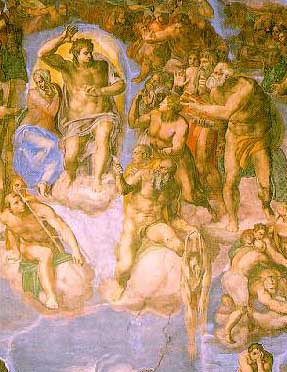About Judgement
(c) Gerhard Altendorf 2007
Translation by Jochen Riess

Printed on yellowish paper of poor quality a book was published shortly after the end of WW II in 1948 under the title “Man in His World”. Somebody from among the many like him was asking himself if there was any meaning to be found in all that had happened to millions of people. So he started remembering, pondering, questioning himself and finally writing down what had come to his mind, all the while keeping within him the secret question: Why? Why did I have to endure all that misery, why did I survive and so many others didn’t? Was there perhaps a hidden meaning behind these events? Well, on Christmas Eve or during the following 12 Holy Nights the colourful and glamorous curtain enveloping our society of consumption and entertainment may have become a little more transparent for suchlike questions to be asked:
What do human beings know about their own reality, still suffering consciously or unconsciously from past experience, from memories or lack of answers?
A new millennium has begun. Will humankind as a whole, will certain individuals make their wisdom and insight available as a contribution towards the formation of our future?
In those early post-war years so far away from today, the author, Hans Zehrer, wrote “Within the souls of those who keep asking, something has happened and taken shape, which is at present being forwarded to the existing authorities in demand of interpretation, explanation and resolution. It is the disappointment about the failure of these authorities to supply sufficient answers which will in the end give this initial movement of search and questioning a more subversive character of disillusion and destruction, resulting in open rebellion and war against these authorities.”
Words which show that a prophetic person like him was able to anticipate what was to come, giving expression to what was felt by many in their need to find answers to their questions and in their quest for meaning, always hoping to find someone who would understand the longing of their souls as well as their anger, their memories and their wounds, all the horror from within – someone, who could offer credible answers instead of creating fresh illusion and deception. In Zehrer’s words: “It is the hope that the pastor be an Augustine, the judge a Solomon, the doctor a Paracelsus and the teacher a Socrates that makes people appeal to the authorities presently in power.” Have our teachers, pastors, judges and politicians ever since tried to meet these expectations? Instead we see how past events cast fresh shadows, how new accusations about past guilt are being tabled. We have seen how Zehrer’s “war against authorities” has become a sad reality. He saw it coming closer. Yet to this day have the underlying reasons never been properly identified. History is apparently acceptable and digestible only in small quantities. Because a clear view is obstructed by our own aggressions and interests. Why is it so difficult to follow the simple suggestion and guideline of Jesus: And why can you not judge for yourselves what is the right course? (Luke 12:57). In other words: Everybody should have learned how to arrive at an authentic and independent judgement. Have the different prevailing theologies and/or ideologies ever tried to teach this to the next generation in exercise of their authority?
Life as such demands: Find your own judgement, find your own answer! Today there are many more ways for more people to choose from ever more opportunities to satisfy their needs. This multiple choice demands a higher degree of discernment. It proves however difficult to develop such independence of judgement. A popular 19th century song stated in protest: “To be a nothing we tolerate no more!” That was plain language. The situation has changed. The attempt to understand one’s own history and to participate in the process of forming an overall picture can never be achieved by denouncing the opposite side. Because the attitude towards the history of one’s own life and the attitude towards the history of one’s own culture are interrelated. To denounce the one will do damage to the other. True as that may be, the eternal doubt will continue to ask: Who will ever achieve such independence of mind? Doesn’t people need guidance, follow rules, be limited by regulations? Where would we get if people followed their own judgement? It wouldn’t work. But there is still this voice of the One who asked in the early days of the new era: Why not for ourselves? He did indeed expect people to do just that. In conclusion: There were times when the ability “to recognize the truth” was considered a worthwhile goal for the faithful. Certainly it demands plenty of careful consideration, insight, communication, attention, mercy and last not least the willingness to accept part of the weight of shouldering a responsibility.

















